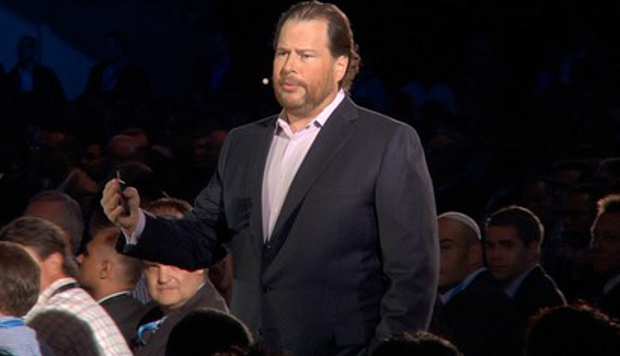Marc Benioff, CEO of Salesforce.com, can always be relied upon to say something interesting (some might say, controversial) and he didn’t disappoint at the announcement of the company’s second quarter results. With revenue up 26% to $2.56 billion and the company forecasting year revenues of around $104 billion for the full year, Benioff was bullish about the CRM vendor’s performance.
“We had a phenomenal quarter of growth, reaching a huge milestone for the company, becoming the first enterprise cloud software company to break the $10 billion revenue run rate,” he said. “We did this faster than any other enterprise software company in history. Our continued momentum as the leader in CRM, the fastest-growing segment of our industry, combined with more than $15 billion in billed and unbilled deferred revenue, puts us well on the path to $20 billion and beyond.”
$20 billion and beyond! It almost sounds like a rallying cry.
The press release didn’t make such a big deal of the fact that net income was down from just under $230 million to $17.7 million for the same period. The reason for the big disparity was tax with the company reporting a tax gain of more than $205 million last year, compared to paying $12.7 million in taxes this year. Again, slightly interesting but hardly earth-shattering.
Before commenting on the company’s performance in a conference call with analysts about the results, transcribed by Seeking Alpha, Benioff chose first to highlight recent events in Charlottesville and Barcelona. He said he was “especially disheartened to see the display of symbols of hatred including Nazi flags and salutes to KKK hoods. The horrible tragic death of Heather Heyer was a senseless act of terror and this hatred must end now”. They were commendable sentiments that showed a willingness to stand up and be counted on significant political and moral issues, something which Benioff has not shied away from in recent times.
From a business perspective, the comments that are likely to draw the most attention concern the company’s competitors and their efforts (or lack of them) in the CRM market. “I have to say our competitors have really done a horrible job in last few years,” Benioff stated. “I just would say that a lot of them have abandoned the CRM market. If you talk to the major CRM analysts and we do that, we just had one of them at our management conference, they are shocked, we’re shocked of how these companies have really walked out of the CRM market, companies that had huge multibillion dollar positions in the CRM have ceded that market to us.”
Positive reinforcement
It’s the kind of pure knockabout stuff we don’t see very much of in today’s business environment because people are trained not to mention the opposition for fear of giving it free publicity and distracting from their own message. That doesn’t mean it doesn’t work. While it’s unlikely those rivals would agree with Benioff, his statement serves two purposes: it reinforce Salesforce’s credentials with customers and prospective customers while simultaneously raising questions in their minds over the commitment of its rivals to the CRM market.
Of course, a more cynical person might frame the argument a different way and say that doing well in a market that most of its rivals have walked out of might lead some to question just how good Salesforce needs to be to succeed.
There’s a danger of complacency. If you truly believe your rivals are doing a terrible job, where does the pressure come on you to keep improving and make even better products and services? Benioff says it comes from the customer. He says the lesson for companies is not to get absorbed in their own corporate politics and bureaucracies but to “recognise the most important thing continues to be the customer… We’re different than other software companies because we really care about that customer and we’re going to make sure that customer is successful”.
Whatever controversy his other statements might generate, that’s a sentiment he would find difficulty in getting any other company to argue with. Even if their customers might.








Subscribers 0
Fans 0
Followers 0
Followers